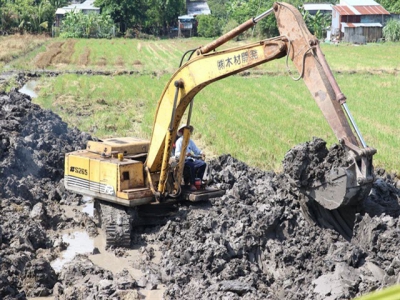Đồng Tháp converts rice fields to grow more lucrative crops

ĐỒNG THÁP — Farmers in the Cửu Long (Mekong) Delta province of Đồng Tháp have switched to growing short-term crops often in rotation with rice and perennial trees on more than 16,000ha of infertile rice fields since last year.
Low-yielding rice fields are plowed and converted to orchards in Cao Lãnh District of the Mekong Delta Province Đồng Tháp. — VNA/VNS Photo Nguyễn Văn Trí
They mostly grow vegetables, corn, sesame, soy bean, sweet potato, lotus, mango, longan, orange, and jackfruit.
The short-term crops provide an income of VNĐ10-300 million (US$428-12,850) per hectare more than rice while the perennial trees fetch VNĐ90-500 million ($3,850-21,420) more, according to the province Department of Agriculture and Rural Development.
Lê Thị Kim Châu, who now uses her 4,000sq.m of land to grow water spinach for their seeds in Hồng Ngự District’s Thường Phước 1, said she needs less water now than for rice and the crop is easy to grow.
Amid climate change and drought, rice yields in her area are not high, and so she decided to grow water spinach, she said.
“[It] offers higher incomes than rice.”
The switch to drought-resistant crops in the dry season has been providing farmers with high incomes in recent years.
Now, in the ongoing summer – autumn rice crop, farmers have switched to sesame on more than 1,000ha.
Lê Hồng Hòa, chairman of the Tân Tạo farmers’ clubhouse in Tân Hồng District’s Bình Phú Commune, said after harvesting his 3ha of winter – spring rice, he decided to switch to sesame in summer – autumn.
The income from sesame is many times higher than from rice, he added.
The rotation also helps reduce diseases during the succeeding rice crop and the soil to regain fertility, according to the department.
Nguyễn Phước Thiện, its deputy director, said the province plans to use a total of 77,000ha of infertile rice fields to grow short - term crops and perennial trees in 2018-20.
Agricultural restructuring
Agricultural restructuring in the province has improved the value of agricultural produce and established co-operation models for producing and consuming agricultural produce.
The province, which was the country’s first locality to implement restructuring agriculture five years ago, has chosen rice, flowers and ornamental plants, mango, tra fish and ducks as key products for restructuring.
Nguyễn Văn Dương, chairman of the provincial People’s Committee, said the province has many support policies to expand advanced farming models and the use of advanced farming techniques to increase value.
The advanced farming models include a model to grow flowers and ornamental plants in net houses with spray irrigation facilities at the Tân Quy Đông Flower and Ornamental Plant Co-operative in Sa Đéc City.
The model to grow mango under Vietnamese and global good agricultural practice standards of the Mỹ Xương Mango Co-operative in Cao Lãnh District and a rice farming model of the Mỹ Đông 2 Agricultural Services Co-operative in Tháp Mười District are among the advanced farming models.
Most of the produce chosen for restructuring is subject to clean production standards and will be guaranteed outlets, according to the province’s Department of Agriculture and Rural Development.
The province’s mango cultivation, which tops the Delta, produces nearly 127,000 tonnes of mango a year.
Mango farmers can earn a profit of VNĐ200-220 million ($8,560-9,410) per hectare a year.
The province produces more than 3 million flower pots and ornamental plants a year. Farmers earn an average profit of VNĐ10 million ($427) for every 1,000 flower pots.
In rice production, the province has developed co-operation models between farmers and companies to help farmers increase profits by VNĐ3-4 million ($128-170) a hectare per crop.
Thiện, deputy director of the department, said: “The province will continue restructuring agriculture to adapt to climate change and establish advanced farming models for rice, fish and fruit cultivation.”
It will also expand efficient irrigation technologies and establish production chains in which farmers co-operate with companies to produce and buy agricultural produce.
The province, one of the country’s largest rice producers, grows about 520,00ha of rice with a total yield of 3.32 million tonnes of paddy a year.
Effective co-operatives
The province’s agricultural co-operatives have played an important role in restructuring agriculture and adapting to climate change.
As of the end of last year, the province had 166 agricultural co-operatives, according to the department.
The co-operatives had an average profit of VNĐ200 million ($8,560) last year. The province’s agricultural co-operatives have applied advanced farming techniques by using net houses, efficient irrigation facilities and organic fertiliser.
Nguyễn Văn Huỳnh, director of the Thuận Tiến Co-operative in Cao Lãnh District, said the co-operative has co-operated with companies to buy rice from its members’ 650ha of rice.
The rice from the co-operative members is bought at VNĐ150 per kilo higher than the market price, he said.
Lê Minh Hoan, secretary of the province’s Party Committee, said co-operatives are an important link in agricultural production chains and help farmers improve production methods in the context of climate change
Có thể bạn quan tâm
Phần mềm

Phối trộn thức ăn chăn nuôi

Pha dung dịch thủy canh

Định mức cho tôm ăn

Phối trộn phân bón NPK

Xác định tỷ lệ tôm sống

Chuyển đổi đơn vị phân bón

Xác định công suất sục khí

Chuyển đổi đơn vị tôm

Tính diện tích nhà kính

Tính thể tích ao hồ



 Traditional craft in Thanh Hoa yearns for golden…
Traditional craft in Thanh Hoa yearns for golden…  Diesel tree: fuel for the alternative energy sector
Diesel tree: fuel for the alternative energy sector